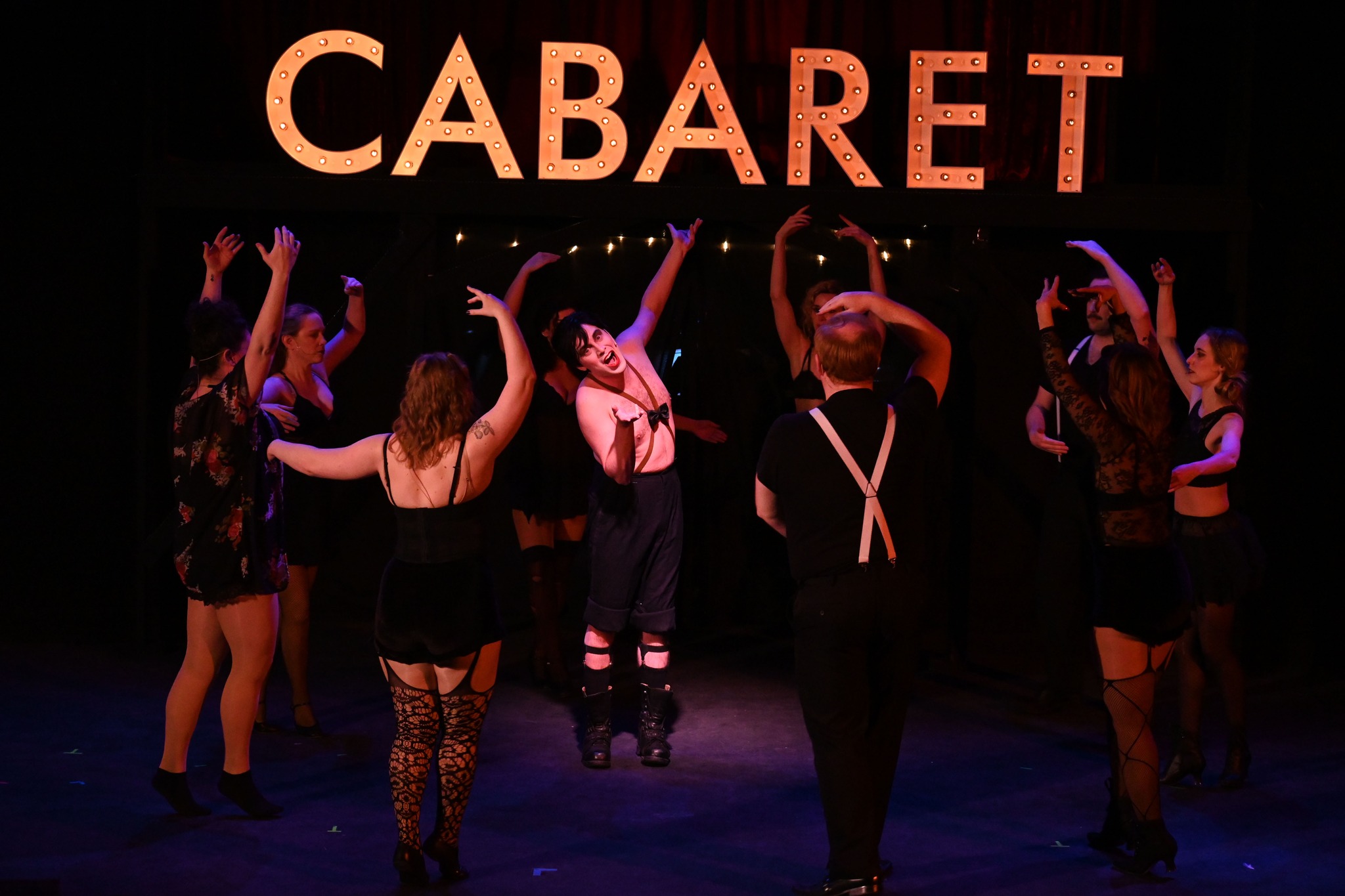Reviewed by George Basler
The events in Cabaret occurred 90 years ago. The musical premiered nearly six decades ago in 1966. But it’s in no way a museum piece. Instead, its theme of a malevolent political party coming to power by exploiting hatred of “the other” remains disturbingly relevant.
The musical, a major hit when it first opened, has established itself as a classic. And the production that opened Feb. 2 for a three-weekend run at the Ti-Ahwaga Performing Arts Center in Owego illustrates why this is the case.
Brilliantly directed by Douglas Harrington and filled with mesmerizing performances, the production leaves you unsettled and should stay with audience members long after they leave the theater.
Set in Germany as Hitler and the Nazis come to power, Cabaret begins as a wild party — pre-war Berlin was known for its rakish nightlife — but the party is ending, and the Holocaust is on the horizon.
Joe Masteroff wrote the book for the musical. It was based on the 1951 play I Am a Camera by John Van Druten, which in turn was based on the 1939 semi-autographical novel Goodbye to Berlin by Christopher Isherwood. John Kander (music) and Fred Ebb (lyrics) wrote the score, which is filled with songs that have become standards, including “Cabaret,” Maybe This Time” and “Money.”
The action in Cabaret alternates between The Kit Kat Club, a seedy nightclub, and life outside the club. Cliff Bradshaw (Andrew Mextorf), an aspiring novelist, arrives in Berlin looking for inspiration for a novel he wants to write. He is entranced by the pansexual wonder of the city and falls in love with Sally Bowles (Ilana Rose Wallenstein), the free-spirited headliner at the club.
A second story features a sweet, but ultimately doomed, relationship between a Jewish fruit vendor (Tony Villecco) and the non-Jewish landlady (Shirley Goodman), who owns the boarding house where Cliff takes up residence.
Hovering over the action is the highly sexualized Emcee in The Kit Kat Club (Ryan Canavan), whose surface boisterousness can’t hide the rot underneath. The character is a symbol of a society coming apart at the seams, and Canavan plays him with a leering grin and a sense of menace that is disturbing and riveting.
While the show’s theme is a serious one, the Ti-Ahwaga production is vibrantly entertaining as well. The dances, staged by choreographer Nicole Purtell, are one highlight of the show. Purtell skillfully moves the scantily clad dancers across the stage in a highly stylized fashion that encapsulates the shady atmosphere of The Kit Kat Club.
The dancers and the Emcee also periodically interact with audience members, an inventive directing choice that brings the audience into the production.
Accompanying the dancers and singers is a terrific, 12-piece live orchestra conducted by music director Jeffrey Wahl. The fact that the music is performed live, not with a prerecorded soundtrack, adds an important level of professionalism to the Ti-Ahwaga production.
Sally Bowles is the show’s leading lady, and Wallenstein give a performance of skill and daring. She gradually reveals the layers of the complex character who, for all her surface charm, is a shallow, self-deluded person who remains uncaring about the tragedy developing around her.
The part requires a performer to sing several show-stopping numbers, and Wallenstein sings the hell out them. A case in point is her performance of “Cabaret,” the musical’s penultimate number. The song has become an up-tempo standard, but, in the context of the show, it is dark and desperate. Wallenstein emotional rendition conveys the feeling that Sally knows she is in desperate straits.
The Cliff Bradshaw character is the narrative center of the show, and Mextorf does a solid job fulfilling this role. He gives an engaging performance as the character transitions from a dazzled observer to someone who recognizes evil is sprouting around him. His realization that he can’t save the deluded Sally is especially well played with a mixture of anger and regret.
Villecco and Goodman have solid chemistry as the middle-aged lovers whose relationship falls victim to the rise of the Nazis. Their performances are touchingly real. This is especially true in their duet, “Marriage,” in which they contemplate a life together. It’s bittersweet and heartbreaking.
Goodman also gives a striking rendition of the song “What Would You Do?”, which asks the pointed question about what route you would make if faced with a disconcerting moral choice. While the character sings the song to Cliff, on another level, she is singing to the entire audience.
The rest of the large cast gives solid support. Deirdre Nolis stands out as a seemingly sympathetic German woman whom Cliff meets on his arrival in Berlin, and Amanda Blake gives a fine comic performance as a tart living in the landlady’s boarding house.
The production, under Harrington’s self-assurance direction, moves briskly from the club to life outside the club. Harrington makes intelligent choices that underline the message of the musical. Especially striking is the shattering and breathtaking finale.
Cabaret is a musical that strives to provoke as well as entertain. The Ti-Ahwaga production does both things at a very high level. It’s an impressive achievement.
IF YOU GO: The Ti-Ahwaga Community Players’ three-weekend run of Cabaret continues through Sunday, Feb. 18, at the Ti-Ahwaga Performing Arts Center, 42 Delphine St., Owego. Friday and Saturday performances are at 8 p.m.; Sunday performances are at 2 p.m. Tickets are available at www.tiahwaga.com or by calling 607-687-2130.




































